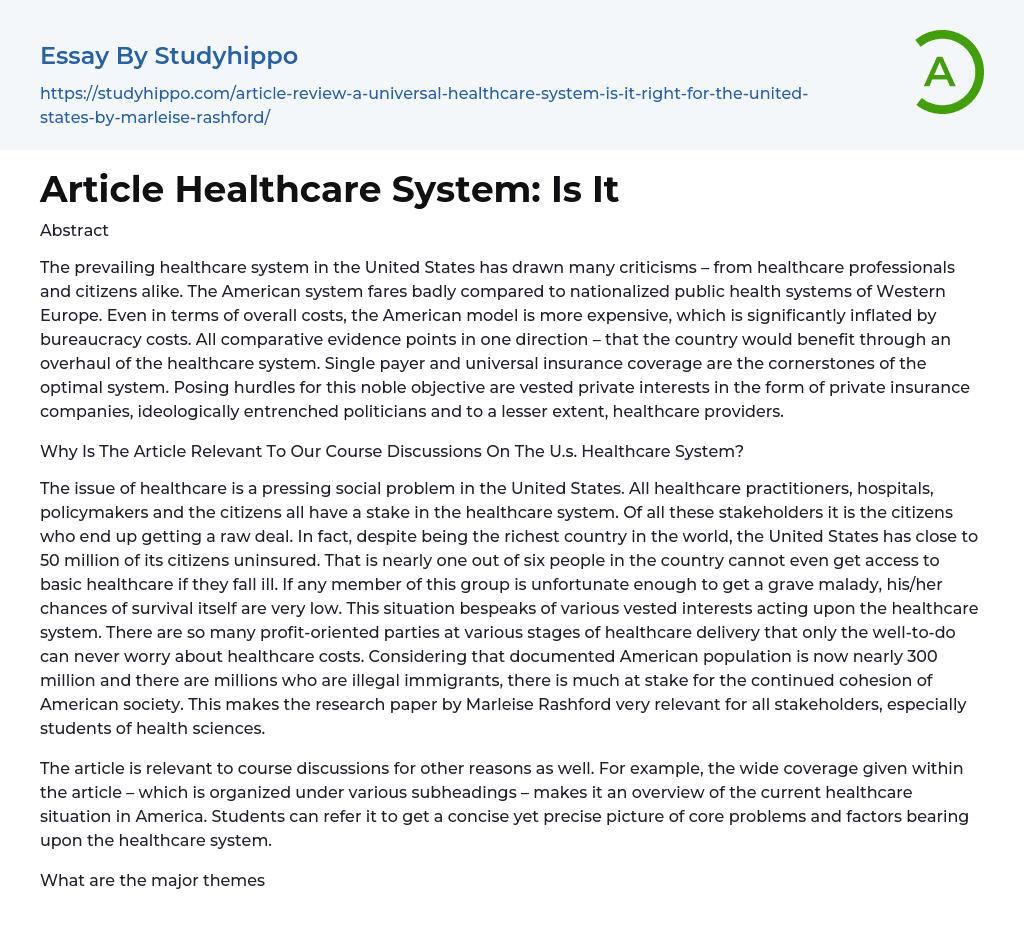Abstract
The healthcare system in the United States has faced criticism from healthcare professionals and citizens due to its inefficiency and high costs compared to nationalized public health systems in Western Europe. Bureaucracy costs play a significant role in these expenses. There is evidence supporting the benefits of reforming the healthcare system for the nation. A recommended approach would be to implement a system that combines single payer and universal insurance coverage as its main components.
The main obstacles to achieving this important objective are private insurance companies, politicians with entrenched ideologies, and healthcare providers, albeit to a lesser extent.
What makes this article relevant to our course discussions on the U.S. healthcare system?
Healthcare is a critical societal matter in America, involving various stakeholders such as healthcare practitioners, hospitals, policymakers,
...and citizens who all have an interest in the system. Unfortunately, it is the citizens who suffer from this problem despite being part of the wealthiest nation globally; almost 50 million individuals lack health insurance coverage.
Approximately 1 in 6 individuals in the country do not have access to basic healthcare when they get sick, and if someone from this group were to develop a severe illness, their chances of survival would be significantly reduced. This situation illustrates that various parties with vested interests hold sway over the healthcare system. Many profit-driven entities are involved in different aspects of providing healthcare, leaving only the wealthy unaffected by concerns about medical expenses. With the documented American population nearing 300 million and millions of undocumented immigrants, the unity of American society is jeopardized. Therefore, Marleise Rashford's research paper holds great relevance for all stakeholders,
especially students studying health sciences.
The article is important for course discussions because it gives a comprehensive overview of the healthcare situation in America. It covers different subheadings, providing students with a concise and precise understanding of the core problems and factors that impact the healthcare system.
The article explores various main themes and discusses how its conclusions and findings were derived. The question raised is whether one agrees or disagrees with these conclusions and why.
One of the primary themes addressed in the article is the search for supporting evidence on universal health coverage in America. Currently, there are 50 million uninsured Americans. Even those who have insurance experience varying levels of benefits based on their ability to afford premiums.
Even many insured Americans may not have insurance support for grave or chronic illnesses, which raises concerns about the moral basis of social policymaking in the country. This gap is particularly evident given America's history of legislation that promotes democracy and plurality. Author Rashford compares the American health system to the nationalized health coverage provided in various European democracies and highlights the strength of his argument: Why can't America adopt successful systems like those in Britain, Canada, and Germany, considering its abundance of resources and larger population? I find this argument quite persuasive and I agree with it.
Rashford includes a thorough examination of a comprehensive survey conducted among registered physicians in America as part of her literature review. The findings of this study indicate that most participants support a nationalized healthcare system. Although they showed less enthusiasm for a single payer system, they largely agree with the public healthcare models followed in Europe. Advocates of the current healthcare
model often highlight the potential financial strain on taxpayers that a public system could bring.
Although healthcare expenditure seems significant, it is actually less burdensome than believed. In advanced industrial societies like Britain, France, and Germany, the percentage of GDP spent on healthcare is lower compared to the USA. The main difference lies in the increased participation of private businesses in healthcare provision within the United States. Additionally, European democracies with nationalized healthcare systems benefit from cost-effectiveness due to a streamlined bureaucracy resulting from a single-payer arrangement.
- Hospital essays
- Physician essays
- Health Care Provider essays
- Universal Health Care essays
- Readmission essays
- Addiction essays
- Anatomy and Physiology essays
- Biodegradation essays
- Cancer essays
- Dental Care essays
- Disability essays
- Disease essays
- Disorders essays
- Health Care essays
- Infectious Disease essays
- Inquiry essays
- Intelligence Quotient essays
- Lung Cancer essays
- Medicine essays
- Neurology essays
- Nutrition essays
- Olfaction essays
- Physical Exercise essays
- Public Health essays
- Sex essays
- Women's Health essays
- World health organization essays
- John Locke essays
- 9/11 essays
- A Good Teacher essays
- A Healthy Diet essays
- A Modest Proposal essays
- A&P essays
- Academic Achievement essays
- Achievement essays
- Achieving goals essays
- Admission essays
- Advantages And Disadvantages Of Internet essays
- Alcoholic drinks essays
- Ammonia essays
- Analytical essays
- Ancient Olympic Games essays
- APA essays
- Arabian Peninsula essays
- Argument essays
- Argumentative essays
- Art essays
- Atlantic Ocean essays
- Auto-ethnography essays
- Autobiography essays




